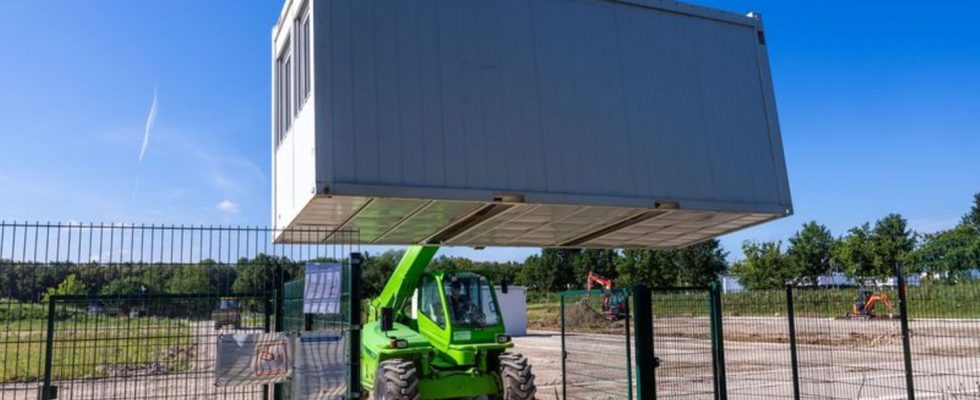migration
Great resentment: container village for refugees in Upahl is growing
The first containers are being delivered for the controversial asylum seeker accommodation in the village of Upahl, which has a population of 500. photo
© Jens Büttner/dpa
At the beginning of the year, the Mecklenburg village of Upahl hit the headlines when the residents vehemently opposed the construction of accommodation for asylum seekers. Now the first containers are set up.
The faded lettering on the plaques on the outskirts of Upahl in Northwest Mecklenburg make it clear how long the protest against the refugee accommodation that is being built there has been going on for a long time.
At the beginning of this year, tumultuous scenes in front of the district office in nearby Grevesmühlen made headlines nationwide. But nothing could stop the project: neither the resistance of the majority of the approximately 500 residents, nor resolutions of the municipal council or appeals to the courts.
On Wednesday, the first containers were unloaded on a fenced area on the edge of the commercial area in Upahl. If everyone is lined up there and equipped with the necessary furniture, up to 250 people can be accommodated in the container village. According to District Administrator Tino Schomann (CDU), the first asylum seekers should move in there by the end of September.
After a compulsory break of several months, the work was now running at full speed, he says. The occupancy should be done gradually. Time is pressing, because the sports halls in Wismar that have been used in the meantime would be needed again for physical education classes when school started. Schomann again pointed out that the district had too few suitable buildings for refugee accommodation and therefore had to use gyms and containers.
Local residents feel overwhelmed by politics
According to the original plans, 400 asylum seekers were to be accommodated in the container village in Upahl, almost as many as the town with its neat homes and well-kept front gardens has inhabitants. After the massive protests, that changed. But it is not only what they believe to be the still disproportionately large number of people who are supposed to live in their neighborhood that is fueling the protests of the residents. They feel overwhelmed by politics and find that their opinions are being ignored.
“We miss democracy,” reads a sheet that a man has stretched out on the fence in his yard. He only reluctantly engages in a conversation, lamenting what he considers to be tendentious reporting about the place. Supporters of the right-wing scene sometimes positioned themselves in the first row during the protest actions. As a result, the whole village felt it had been placed in the right-hand corner. But the pensioner is most excited about the procedure. The residents of Upahl were not included in the decisions to build the container village and their concerns were not heard, the man complains.
Employees of a company based in the neighboring commercial area describe the concerns that people in the region associate with the refugee accommodation. You can no longer be sure when you cycle to the early shift in the morning, says one of them. It’s certainly not all criminals, says a colleague. But when many young men live there for weeks without employment or distraction, you don’t know what ideas they will come up with.
Governor admits mistakes
District Administrator Schomann is aware of people’s fears and also admits mistakes. “We live in turbulent times. The procedure in Upahl was not good at the time, not happy, but necessary in order to be able to reserve the containers,” says the district administrator, but immediately draws the line further. The dissatisfaction of the citizens with the refugee policy of the federal government is huge. He gets to feel this again and again in conversations at residents’ meetings or city festivals. The CDU politician believes that federal ministers should also engage in such talks. He demands measures from Berlin to consistently limit immigration: “Don’t just talk. Do!”
Despite the reduction in the capacity of the refugee accommodation, additional financial transfers from the state to the municipality and the promise to use the bus lines from Upahl to Grevesmühlen or Schwerin more frequently, the protest is still there. However, it is mainly directed against the federal asylum policy, which burdens the municipalities beyond the limits of what is affordable. Many places in Germany have the same problems with housing the refugees and their integration. Upahl has become a symbol of “what’s going wrong in Germany,” says Schomann.

